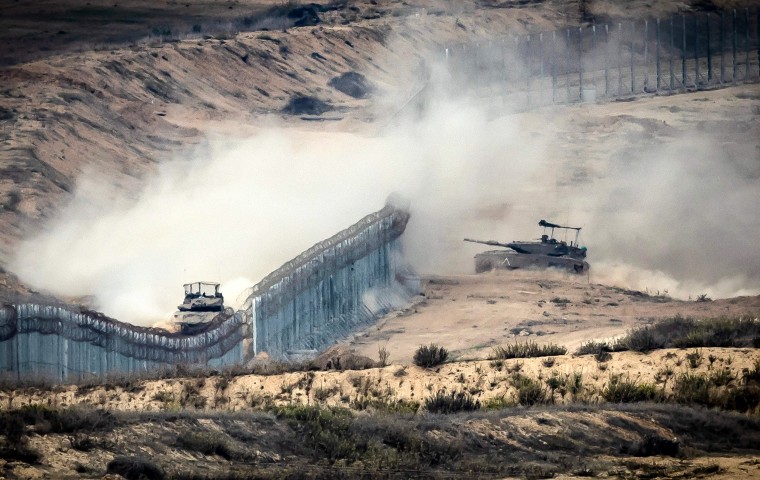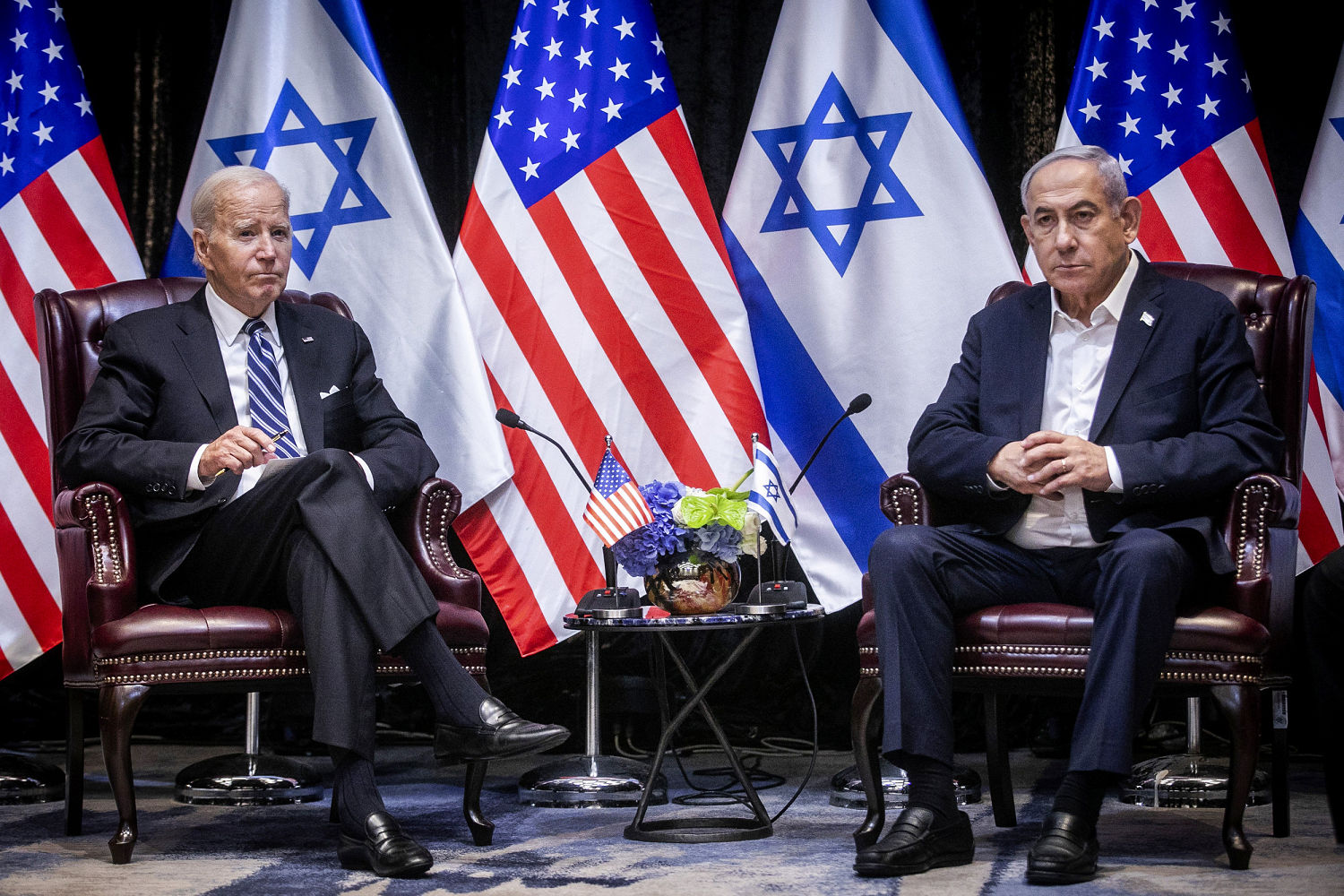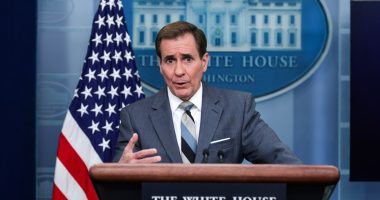Biden administration officials are increasingly at odds with Israeli Prime Minister Benjamin Netanyahu’s government over how it is conducting its military assault on Hamas and how the two countries envision the political future of Gaza, current and former U.S. officials say.
Amid dire scenes from hospitals in Gaza and a rising civilian death toll, frustration is building among administration officials who have repeatedly appealed to Netanyahu and his government to take more action to protect Palestinian civilians and allow more humanitarian aid into Gaza.
“We are concerned that they aren’t doing everything possible to reduce civilian casualties,” said one administration official. The comments came as Israeli forces moved in on Gaza City’s main hospital, where they said Hamas militants have been operating from an underground command center.
The friction between the two governments is over crucial long-term questions about who will govern the Palestinian enclave after Israel completes its military offensive. That includes the role of the Palestinian Authority — which currently governs the West Bank — and reviving diplomatic efforts for a two-state solution and the establishment of a Palestinian state, current and former officials said.
“There’s a looming gap between the U.S. and Israel on where we’re going to be in a month or two,” one former U.S. official said.
Although the U.S. and Israel have tried to present a united front publicly, the divide was exposed after Netanyahu last week said that Israel would have a security role in Gaza for an indefinite period.
Less than 24 hours later, Secretary of State Antony Blinken pushed back, making it clear the U.S. would not accept any suggestion of a reoccupation of the Gaza Strip or a blockade of the enclave.
The U.S. believes there can be “no reoccupation of Gaza after the conflict, hence, no attempt to blockade or besiege Gaza,” and “no reduction in the territory of Gaza,” Blinken said during a visit to Tokyo.
Blinken also laid out his most detailed vision yet for the future of Gaza, saying it “must include Palestinian-led governance and Gaza unified with the West Bank under the Palestinian Authority.”
The Palestinian Authority, which was pushed out of Gaza by its rivals in Hamas, administers semiautonomous areas of the Israeli-occupied West Bank. The U.S. and other world powers view the Palestinian Authority, which is internationally recognized but lacks strong popular support, as the only realistic alternative to Hamas, which the U.S. and other Western nations considers a terrorist organization.
Netanyahu, in turn, brushed off Blinken’s proposal, telling NBC News’ “Meet the Press” that Gaza needed to be demilitarized and deradicalized and any Palestinian force including the Palestinian Authority was not up to the job.
The exchange between Blinken and Netanyahu illustrated how the two allies are struggling to find common ground about who will govern Gaza in the wake of the Hamas attack on Oct. 7 that killed some 1,400 Israelis, mostly civilians.
Matthew Levitt of the Washington Institute for Near East Policy think tank said the administration has been waiting for Israel to outline a realistic proposal for what could follow after its military operations in Gaza.
“I think there’s a frustration that more hasn’t been done and put into what comes next,” Levitt said.
The discord between Israel and the Biden administration will worsen in coming months. Establishing a Palestinian state is something that hard-right members of Netanyahu’s government vehemently oppose.
“This is not where the government of Israel is going to want to go because they would prefer to continue dealing with Gaza as an issue apart from the West Bank, apart from the larger question of an Israeli-Palestinian political resolution,” said Gerald Feierstein of the Middle East Institute think tank, a former senior U.S. diplomat. “There’s going to be conflict over that.”
Biden administration officials also are wary of an idea being floated by former Israeli officials to carve out a heavily fortified “buffer zone” in northern Gaza to protect Israel from any future attack from Gaza.
“What we’re going to want to do is keep a security strip after the war, a buffer zone, to move them away from Israel, say 1 kilometer deep. And there will be some sort of transitory period after which there’ll be a form of self-governance that works for them,” former Israeli Prime Minister Naftali Bennett told NBC News’ Andrea Mitchell.
Asked if the buffer zone would mean seizing territory from the Palestinian enclave, Bennett said: “There’s a price to pay when you go and murder innocent civilians. … We’re not doing it because we want to grab land. As I said, we have no desire for that. But we have to protect our people.”
Zaha Hassan, a human rights lawyer and a fellow at the Carnegie Endowment for International Peace think tank, said such a proposal would violate international law and “would mean effectively annexing Gazan territory.”
A security zone on Gazan territory would imply displacing a Palestinian community made of mostly refugees to “a smaller space,” reinforcing fears in the region that Israel planned to permanently push Palestinians out of northern Gaza, she said.
“It’s neither legal nor is it morally acceptable,” said Hassan, who was a member of the Palestinian delegation to exploratory peace talks in 2011 and 2012. “And humanitarian wise, it wouldn’t fly.”
Biden administration officials said a buffer zone controlled by Israel inside Gaza would mean shrinking the enclave’s territory, which the White House sees as unacceptable. “The U.S. has in principle said there should be no Palestinian displacement from Gaza. We are not convinced this is the best way forward,“ a second senior administration official said.
The Biden administration has also been alarmed about rising violence against Palestinians by Israeli settlers in the West Bank. When Blinken met with Netanyahu earlier this month, he told both the prime minister and his war Cabinet that the incidents were “unacceptable,” the State Department said.
‘Like Pulling Teeth’
The Israeli war Cabinet, divided over what should follow in Gaza and mostly skeptical of reviving a peace process for a two-state solution, is preoccupied now with the military operation against Hamas and keen to demonstrate to the Israeli public that the country’s security has been restored, according to analysts and former Israeli officials.
“Israel doesn’t have a comprehensive, coherent vision as to the Gaza Strip after Hamas is eliminated,” said Nadav Eyal, an Israeli commentator and journalist. “It’s not that it is hiding its intentions. It’s still thinking about the possibilities for the Strip.”
Efforts to bolster the flow of humanitarian aid into Gaza have required laborious talks with the Israelis, two administration officials said. Blinken secured an agreement in principle for Israel to periodically pause its military operations after meetings with Israeli officials on Nov. 10. But discussions continued between the two governments for days afterward and an announcement did not come until a week later, the officials said.
“Every step of this is like pulling teeth,” one official said.
Despite the growing divergence with Israel, there is no sign Biden is ready to threaten withholding U.S. military assistance or to impose other consequences on Israel.
Biden remains committed to his administration’s approach, trying to exert influence over Israel behind closed doors and prevent the war spreading across the Middle East, administration officials said.
“He believes we have influence and that influence has worked. We’re comfortable with the influence we have. But things aren’t moving as fast as we’d like,” one official said.

Source: | This article originally belongs to Nbcnews.com














